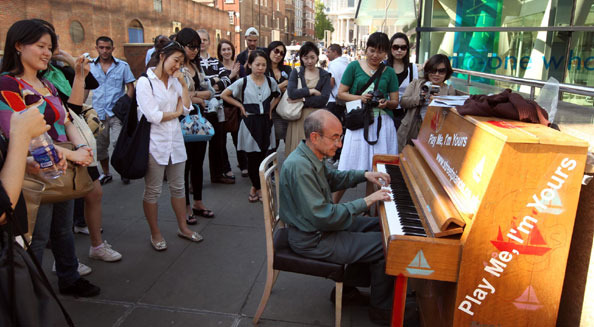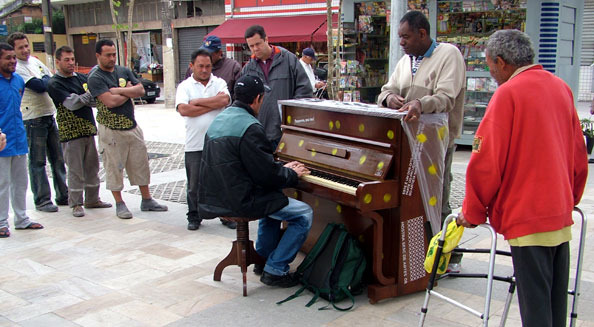It's all about the classical music composers and their works from the last 400 years and much more about music. Hier erfahren Sie alles über die klassischen Komponisten und ihre Meisterwerke der letzten vierhundert Jahre und vieles mehr über Klassische Musik.
Total Pageviews
Monday, October 24, 2022
Why Is This Music So Memorable? How to Train Your Dragon
Friday, October 21, 2022
‘Classical Music – Saviour of the Burnt Out?’
By Chris Lloyd, Interlude

© streetpianos.com
The previous article (Einaudi: The Saviour of Classical Music) was a provocation designed to explore the relationship of a new generation of people to a flourishing genre of music based around relaxing solo piano. Because of the requirements of word scarcity in opinion pieces, I made a quick argument that aside from urging the reader to rethink their public posturing on music they don’t like, suggested that a renaissance is occurring in piano playing, with a large upswell of interest from adults showing an interest in learning the instrument.
I briefly mused on why this could be the case: is it because everyone got that bored of Netflix during global pandemic lockdowns that they looked for other forms of entertainment, and all the local knitting classes were full? Perhaps. But I believe the cause goes deeper, and includes the desire of people to engage with tactile activities (such as knitting, or pottery, or drawing classes) to counter their ever-increasingly digitally-dominated lives; as well as the relaxing and meditative nature of many popular contemporary piano artists. There is a beauty we can all relate to in the act of learning, making, and doing; the feeling of achievement when learning something difficult and complex; or the art of creating something without the pressure of being fantastic at it (i.e. an activity that is counter to their professions); an emotional outlet that one can turn to, to let go/fade out/lose oneself – and probably several more, personally specific reasons. As it turns out, playing piano is a brilliant way to achieve all of these goals.
In a conversation with conductor and academic Leon Botstein, I asked what his prognosis was for classical music makers in a western society who has seen a rapid evolution of entertainment consumption behaviours: e.g. from serialised television, to Netflix binge-watching, to TikTok microprogramming, all in a few short years. Where does this leave us in classical music – an art form that requires focused attention over long periods of time to engage with? Surely we risk becoming even more niche if our art form was completely contrary to audience preferences?
Botstein’s answer was shockingly optimistic: in his view, the vast majority of people are continuously looking for ways to better their experience on earth. These are the people who wake up and decide to train for a marathon, or sign up for yoga and Pilates classes, or learn about meditation or mindfulness, or turn to a vegan diet and eschew single-use plastics. They are looking for something that allows them to engage with themselves and others in a deep way, looking for community, looking for self-betterment. And, as Botstein so joyfully put it – this is exactly what classical music offers people.

© streetpianos.com
We are standing on a goldmine, a product that time has proven undeniably fantastic; a product that is completely free-to-use (that is, anything outside of copyrighted material); and one that has the potential to add value to a huge amount of people that haven’t come across it yet! If this isn’t a cause for optimism, then I don’t know what is.
The question then becomes simple: what is the method of attracting all of these potential music-engagers and showing them how valuable it can be for their existence? Well firstly, we need to rebrand a bit. The perception of our industry from the outside sucks, period. If you agree that our product is good, then you have to agree that our packaging of it is rubbish by virtue of the fact that most people don’t want to come along to see it. Even the most delicious cake would go stale in a grey sack with a picture of a judgemental grandmother on the front of it.
Then, we need to think of ways to deliver this music that is easier to access on a basic level. We need to make it accessible and relevant to people, where they feel like they want to engage with it because it offers them immediate satisfaction and value. Oh, thanks very much Einaudi and co for creating an audience of people already engaging with the material, and sorry we’ve been such twats these past few years.
There are countless different ways this is being done and thought about: Lie Down and Listen is a London based project by concert pianist Christina McMaster as one of many examples. In my own work with the 1781 Collective I’ve explored the utility of ritual and narrative to design concert programmes that take people on a journey; a recent experience had me in front of roughly one thousand people at the closing set of a large techno festival in Germany – all of whom were on some form of stimulative substance – and my job was to take them down calmly after five days of non-stop raving to a relaxed state where they could begin to accept the reality that the Festival was finishing and they’d have to go to work the next day. A discussion with a colleague last week resulted in a plan for an meditation app which would be ‘Like Headspace, but with Classical Music.’

© meditatia.com
If you think that this can’t be done, just think about the yoga industry. What was ostensibly an extremely esoteric, complex spiritual practice, with thousands of years of complex training required to achieve enlightenment, has now been reinvented as an activity that countless millions of people around the globe engage with daily; from the most basic points of entry (such as Yoga with Adriene which couldn’t be further from what a 19th century Yogi would have imagined of their work); to people travelling around the world for Yoga retreats; becoming Yoga instructors; etc. Our equivalent might be in the person who listens to classical music for relaxing only, to taking piano lessons and going to concerts, to attending piano retreats, etc.
We’ve all bemoaned the albums and playlists of ‘Classical Music for Relaxing’ as a direct predecessor to the notion that ‘classical music is boring’, because as we all know, classical music routinely expresses the entire range of human emotion on a frequent basis, with relaxation only one tiny component of this. I’m not advocating for a use of music purely to help stressed people relax, but instead to use this existing perception to open a channel towards the full potential of music; whilst simultaneously helping guide listeners and enthusiasts to the different levels of engagement they can choose.
We cannot continue to demand that audiences listen to music in only one way – and an outdated, stuffy, and pretentious way at that. Instead, we need to start thinking about how we can take our product and passion to bring it to as many people as possible, and stop judging those who do things differently from us. What if we promoted our art form as a journey with an endless level of depth that one can choose to dive into, and one that can be satisfying at whatever level you choose to engage with? From Ludovico to Ligeti, there’s something for everyone, and everyone is welcome.
John Eliot Gardiner - his music and his life
John Eliot Gardiner stands as an international leader in today’s musical life, respected as one of the world’s most innovative and dynamic musicians, constantly at the forefront of enlightened interpretation.
Sir John Eliot Gardiner is revered as one of the world’s most innovative and dynamic musicians, constantly in the vanguard of enlightened interpretation and standing as a leader in contemporary musical life. His work, as founder and artistic director of the Monteverdi Choir (MC), English Baroque Soloists (EBS) and Orchestre Révolutionnaire et Romantique (ORR), has marked him out as a key figure both in the early music revival and as a pioneer of historically informed performances.
As a regular guest of the world’s leading symphony orchestras, such as the London Symphony Orchestra, Symphonieorchester des Bayerischen Rundfunks, Royal Concertgebouw Orchestra and Gewandhausorchester Leipzig, Gardiner conducts repertoire from the 17th to the 20th centuries. He was awarded the Concertgebouw Prize in January 2016.
The extent of Gardiner’s repertoire is illustrated in the extensive catalogue of award-winning recordings with his own ensembles and leading orchestras including the Vienna Philharmonic on major labels (including Decca, Philips, Erato and 30 recordings for Deutsche Grammophon), as wide-ranging as Mozart, Schumann, Berlioz, Elgar and Kurt Weill, in addition to works by Renaissance and Baroque composers. His many recording accolades include two GRAMMY awards and he has received more Gramophone Awards than any other living artist.
Gardiner has also conducted opera productions; at the Royal Opera House, Covent Garden, at the Vienna State Opera and at Teatro alla Scala, Milan. From 1983 to 1988 he was artistic director of Opéra de Lyon, where he founded its new orchestra.
Recent achievements with the Monteverdi ensembles include the RPS award winning Monteverdi 450 project in 2017, a reprise of the 2000’s famous Bach Cantata Pilgrimage, which toured to some of Europe’s most famous concert halls and churches in 2018, a five-year exploration of Berlioz’s major works to mark the 150th anniversary of the composer’s death, and a landmark performance of Verdi’s Requiem at London’s Westminster Cathedral in aid of Cancer Research UK. In 2019 Gardiner conducted new productions of Handel’s Semele and Berlioz’s Benvenuto Cellini, and gave his debut performances in Colombia, Russia, Brazil, Uruguay, Argentina and Chile. The beginning of 2020 saw Gardiner conduct the ORR in three Beethoven symphony cycles as part of the Beethoven 250 anniversary celebrations, with concerts at Barcelona’s Palau de la Música, New York’s Carnegie Hall, and the Harris Theatre in Chicago. In 2021 he conducted a live streamed performance of Bach’s St John Passion from Oxford’s Sheldonian Theatre, appeared at several of Europe’s most prestigious music festivals, including his 60th concert at the BBC Proms, and performed Berlioz’s sacred oratorio L’enfance du Christ at the Monteverdi Choir & Orchestras new London home, St Martin-in-the-Fields.
An authority on the music of J. S. Bach, Gardiner’s book, Music in the Castle of Heaven: A Portrait of Johann Sebastian Bach, was published in October 2013 by Allen Lane, leading to the Prix des Muses award (Singer-Polignac). Among numerous awards in recognition of his work, Sir John Eliot Gardiner holds several honorary doctorates. He was awarded a knighthood for his services to music in the 1998 Queen’s Birthday Honours List.
Classical pianist gives curious toddler an impromptu piano lesson on train station concourse

By Sophia Alexandra Hall, ClassicFM
@sophiassocialsThis very cute duet has gone viral on TikTok, drawing in new fans for both the street pianist and his young protégé...
Music has the power to surprise you – you never know where that next duet or inspiring collaboration could come from.
Karim Kamar is a contemporary classical pianist & composer from London. He’s performed at some of the country’s most iconic venues, from Ronnie Scotts to the Royal Albert Hall, but his latest viral moment took place on a rather more unusual stage.
Kamar has racked up millions of views across platforms such as YouTube, Instagram Reels, and TikTok for his #StreetPiano performances – where the musician films himself playing impromptu concerts on public pianos.
Pianos in train stations have become surprisingly commonplace across the UK and other countries, as a joyful way for travellers to bring music to each other at the start, middle, or end of their journeys.
In his latest video, Kamar is filmed being adorably ambushed on a piano in London’s St Pancras International train station by a musically curious toddler. What followed was an unexpected duet between the two musicians. Kamar helps the young child up onto the piano stool, lifting them up (both literally and figuratively) so their small hands can reach the massive keyboard.
The classical pianist then takes the toddler’s right-hand, and helps them to start playing the familiar tune of Twinkle Twinkle Little Star. Kamar accompanies them both with chords in his left-hand.
The young (and perhaps first-time) pianist’s joy is evident from the toddler’s expression, and the wonderful duet has left TikTok fans in a similarly giddy-state.
One TikTok viewer commented, “You just created a core memory & maybe inspired the little fellow!!”, while another added “This [interaction has] probably sparked a lifelong love of piano in this little one ❤️”.
And it’s not just children who are entranced by Kamar’s performances. Adults are equally impressed by the musician’s prowess. In the above video, Kamar has passersby bringing their daily commute to a standstill just to listen in.
But, if you don’t happen upon Kamar during your next train station journey, you can always follow him on Youtube or his other social media platforms for more of his musical adventures.
Thursday, October 20, 2022
Mozart: Piano Concerto No. 23 | Menahem Pressler, Gulbenkian Orchestra & Leo Hussein
The San Miguel Philharmonic Orchestra (Great Filipino Love Songs)
The San Miguel Philharmonic Orchestra (Great Filipino Love Songs)
Wednesday, October 19, 2022
The Music Of The Night
JAYA, POPS FERNANDEZ AND KUH LEDESMA OPM divas look forward to girls' getaway to Coachella
The country's top OPM queens Pops Fernandez, Kuh Ledesma and Jaya are due to perform in Southern California in November.
By Tessa Mauricio-Arriola, Manila Times
It isn't just the immeasurable Filipino community in SoCal (Southern California) that's looking forward to the day and date of November 12 — that is, the much-anticipated performance of the Philippines' top three music divas at Fantasy Springs Resort Casino in Coachella, California. Queen of Soul Jaya, Concert Queen Pops Fernandez and Pop Diva Kuh Ledesma are just as eager to get the concert started for a number of reasons.
The first is, of course, the honor and opportunity to spend time with our countless kababayan in the US after the long pandemic, while the second reason is more personal.
In a digital interview, Pops — who had just completed an American concert tour with the all-male Hitmakers (Nonoy Zuniga, Marco Sison, Hajji Alejandro and Rey Valera) over the summer — told The Manila Times, "It's going to be a different kind of fun for us compared to what I experienced with the boys."
With a glint in her eye, she continued, "Yon kasi, magulo talaga — tawanan all the time — but very male ang humor. Like I said before, I really had so much fun with the four of them on the road, but this one — I have to say it's more of the bonding with the girls that I'm really excited about."
The Concert Queen explained that much as the public sees them together now and then on TV or in pre-pandemic shows, she, Jaya and Kuh haven't been able to catch up in a very long time now.
Of course, Jaya now lives in the US, while Kuh prefers to be tucked away on her farm when not working.
Pops, on the other hand, constantly shuffles between Manila and the US to be with family on both sides of the globe.
"Iba kasi when we're all together doing a show abroad. We really get to talk about life, our kids, our plans, and I always come out of it learning something from the both of them."
Nodding in agreement, Kuh interjects, "Having fallen in love and coming out of those relationships, we can really relate to each other. But while it was all tears before, ngayon iba na ha. We've long moved on and happy na kami!"
For her part, Jaya simply longs for friends and colleagues from here and just can't believe her luck that she'd be in a show again with the Concert Queen and the Pop Diva of the Philippines.
The special concert is fittingly titled Three Divas. According to its showrunner, Enteng Perez, "This is produced by New Paradise Entertainment and Fantasy Springs Casino."
Very confidently, he added, "Three Divas will reactivate the Filipino concert scene in the Coachella Valley again. It's been a while since there were Filipino shows in this market, so Jaya, Pops and Kuh will definitely jumpstart more shows in the desert region of Southern California."
Coachella Valley is known to have big music festivals in the US, and the fact is not lost on the three OPM queens.
It simply adds to the excitement that keeps growing in their diaphragms. Seasoned as they are, all three divas always savor working with each other. Their individual achievements, both in their professional and personal lives, have taken them far beyond the need to compete with fellow performers.
"Exposure-wise, we'll have many production numbers together as a trio, but we will each get 20 minutes where bahala na kami what to sing and do," shared Kuh.
Filipinos in SoCal should therefore expect this one-night-only to be one for the books filled with the three divas' most memorable hits. There will surely be "Dahil Tanging Ikaw" and "Wala na bang Pag-ibig" from Jaya; "Don't say Goodbye and "Bakit Ngayon Ka lang Dumating" from Pops; and, "I Think I'm in Love" and "'Til I Met You" from Kuh, just to name a few.
With that, there's just one more thing left to say. And that is: "Please, Three Divas, promise to bring your show to Manila too."
Tickets to the US concert are available via VP Entertainment with phone number 702-8569723.
.jpg)


.webp)